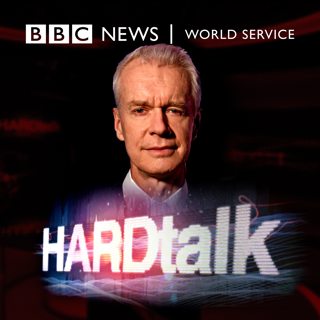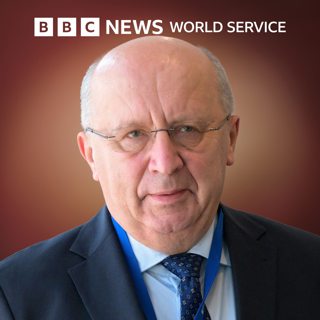
Amos Gilad – Director of Policy, Israeli Ministry of Defence
Zeinab Badawi talks to Amos Gilad, Policy Director at the Israeli Ministry of Defence. Is the Arab Spring a blessing or a disaster for Israel?Upheaval in the Arab world, especially in Syria, means political realities are still evolving in the Middle East. For years Israel has seen itself as living in a hostile neighbourhood, its borders tense and prone to bouts of violence. Hamas rules in Gaza and the peace process with the Palestinian Authority is going nowhere. And then there's Iran - neither an Arab nation nor a neighbour, but a powerful backer of Syria's government in the current turmoil. And for Israeli military planners, a potential threat from a nuclear-armed Iran is probably their biggest pre-occupation.(Image: Amos Gilad)
31 Juli 201223min

Sheikh Hasina - Prime Minister of Bangladesh
Sheikh Hasina has been Prime Minister of Bangladesh for the last three and a half years. It’s her second term in office and throughout her time at the top she’s attracted controversy and criticism in equal measure. Bangladesh is densely populated, desperately poor and riven with corruption and political violence. Back in 2009 Sheikh Hasina vowed to clean up government and heal the country’s divisions. So what’s gone wrong?(Image: Sheikh Hasina. Credit: Getty Images)
29 Juli 201223min

Extratime: Nawal El Moutawakel -Member of the International Olympic Committee
At the Los Angeles Olympics in 1984 a diminutive Moroccan runner named Nawal El Moutawakel won the 400 metres hurdles and so became the first Arab and Muslim woman to win Olympic gold. She says her victory changed her life forever and propelled her towards a career in sports administration and as a passionate advocate of women in sport, especially in the Islamic world. She's now an influential member of the International Olympic Committee. With current IOC president Jacques Rogge due to step down next year, could she be in line to succeed him? Nawal El Moutawakel talks to Rob Bonnet.(Image: Nawal El Moutawakel in 2010. Credit: Getty Images)
27 Juli 201223min

Arnold Ekpe - CEO Ecobank Transnational Inc
Six of the world's ten fastest growing economies are in Sub- Saharan Africa. The World Bank predicts a decade of African growth which Europe can only dream of, but how realistic is the excitable talk of economic transformation in the world’s poorest continent? Stephen Sackur speaks to Arnold Ekpe, CEO of Ecobank, which boasts eight million customers across 32 Sub-Saharan nations. As economic opportunity beckons, are Africans ready to seize it?
24 Juli 201223min

Extratime: Jonathan Edwards - Olympic triple jump gold medallist
More than 10,000 athletes are about to compete at the London Olympics. The spotlight will certainly be on them but one former champion, Jonathan Edwards, will take a particular interest. He won Olympic gold in the triple jump and his world record in the event has stood secure for 17 years. On present form no triple jumper to compete in London looks close to breaking it. He was also part of London's bid when the city was awarded the Games in 2005. Now he's the athletes' representative on the Games organising committee overseeing preparations for the athletes. London is almost at the start line but what did it take to get this far? Jonathan Edwards talks to Rob Bonnet.(Image: Jonathan Edwards. Credit: AP Photo/Herbert Knosowski)
23 Juli 201223min

20/07/2012 GMT
Baaba Maal is maintaining a West African tradition: he is an internationally renowned musician with a strong political voice, like Fela Kuti and Youssou N'Dour before him. His campaigning touches on sensitive subjects, from women's rights to HIV and climate change. Africa is currently a jarring mix of rapid economic growth and life-threatening poverty. As the continent changes, is the music changing too?(Image: Baaba Maal performing. Credit: Getty Images)
19 Juli 201223min

James Robinson - Professor of Government, Harvard University
Stephen Sackur speaks to the renowned Harvard academic James Robinson. In a recent book, written together with Daron Acemoglu, he tries to answer one of the most basic questions of global economics and politics: why do some nations thrive while others fail? What does Norway have that Mali lacks? There are of course multiple answers based on physical geography, resources and cultural differences, but James Robinson is adamant one factor determines economic success much more than all others: the development of resilient, inclusive political institutions. Put crudely, the idea is political freedom begets prosperity - but is that always true?(Image: James Robinson)
18 Juli 201223min

Dame Jocelyn Bell Burnell - Astrophysicist
Stephen Sackur speaks to a scientist of rare distinction. Jocelyn Bell Burnell was a key member of the team which discovered pulsars and neutron stars in the late 1960s. She became one of the world’s most renowned astrophysicists - remarkable for the originality of her research, but also for being one of the few prominent women in her discipline. Throughout her career she's blazed a trail for women in a predominantly male world. Why are there so few women at science's top table?Image: Jocelyn Bell Burnell
15 Juli 201223min






















